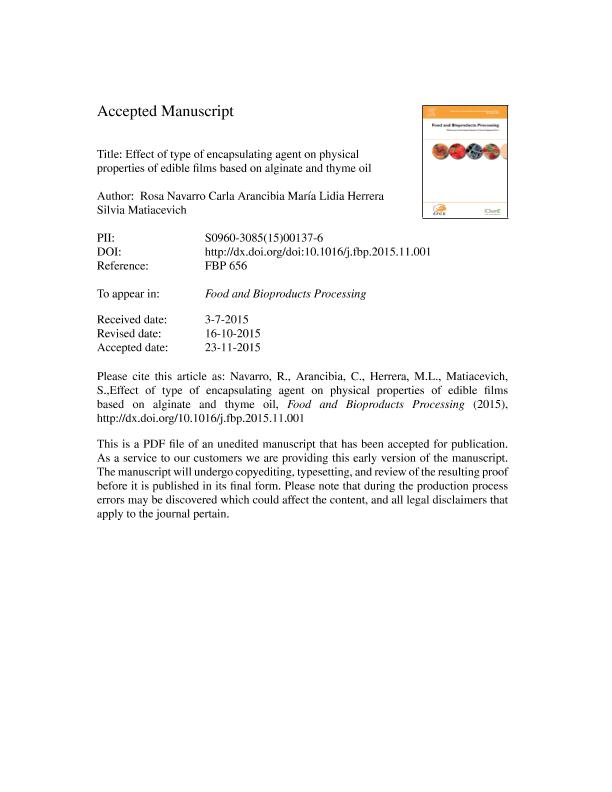Artículo
Effect of type of encapsulating agent on physical properties of edible films based on alginate and thyme oil
Fecha de publicación:
01/2016
Editorial:
Institution of Chemical Engineers
Revista:
Food and Bioproducts Processing
ISSN:
0960-3085
Idioma:
Inglés
Tipo de recurso:
Artículo publicado
Clasificación temática:
Resumen
Active edible coatings incorporating antimicrobial agents such as thyme oil are studied to improve the shelf-life of fresh foods. The type of encapsulating agents used to microencapsulate the active compound could affect both, emulsions and film's physical properties. The aim was to study the effect of different encapsulating agents (trehalose, β-cyclodextrin and Tween 20) on physical and antimicrobial properties of alginate/thyme oil emulsions and films. Physical and antimicrobial characterization of film-forming emulsion and films were developed. Results showed differences in rheological behavior, particle size and stability of emulsions by encapsulating type. The highest stability of emulsions containing Tween 20 (instability of 0.69%) was attributed to more interactions between components (observed by FTIR) and the lowest particle size, but other samples also showed high stability (instability <5%). The stability of emulsions did not correlate with films microstructure indicating that interactions amount components changed when solvent was evaporated. Films containing trehalose and β-cyclodextrin had less color and opacity than Tween 20, which is an advantage by industrial applications by coating due cannot affect the organoleptic characteristics of a fresh product. In conclusion, it is important the choice of encapsulating agent in order to use for developing active coatings with potential for applications in fresh food.
Palabras clave:
Alginate
,
Emulsions
,
Encapsulating Agents
,
Films
,
Physical Properties
,
Thyme Oil
Archivos asociados
Licencia
Identificadores
Colecciones
Articulos(ITPN)
Articulos de INSTITUTO DE TECNOLOGIA EN POLIMEROS Y NANOTECNOLOGIA
Articulos de INSTITUTO DE TECNOLOGIA EN POLIMEROS Y NANOTECNOLOGIA
Citación
Navarro, Rosa; Arancibia, Carla; Herrera, Maria Lidia; Matiacevich, Silvia Beatriz; Effect of type of encapsulating agent on physical properties of edible films based on alginate and thyme oil; Institution of Chemical Engineers; Food and Bioproducts Processing; 97; 1-2016; 63-75
Compartir
Altmétricas




